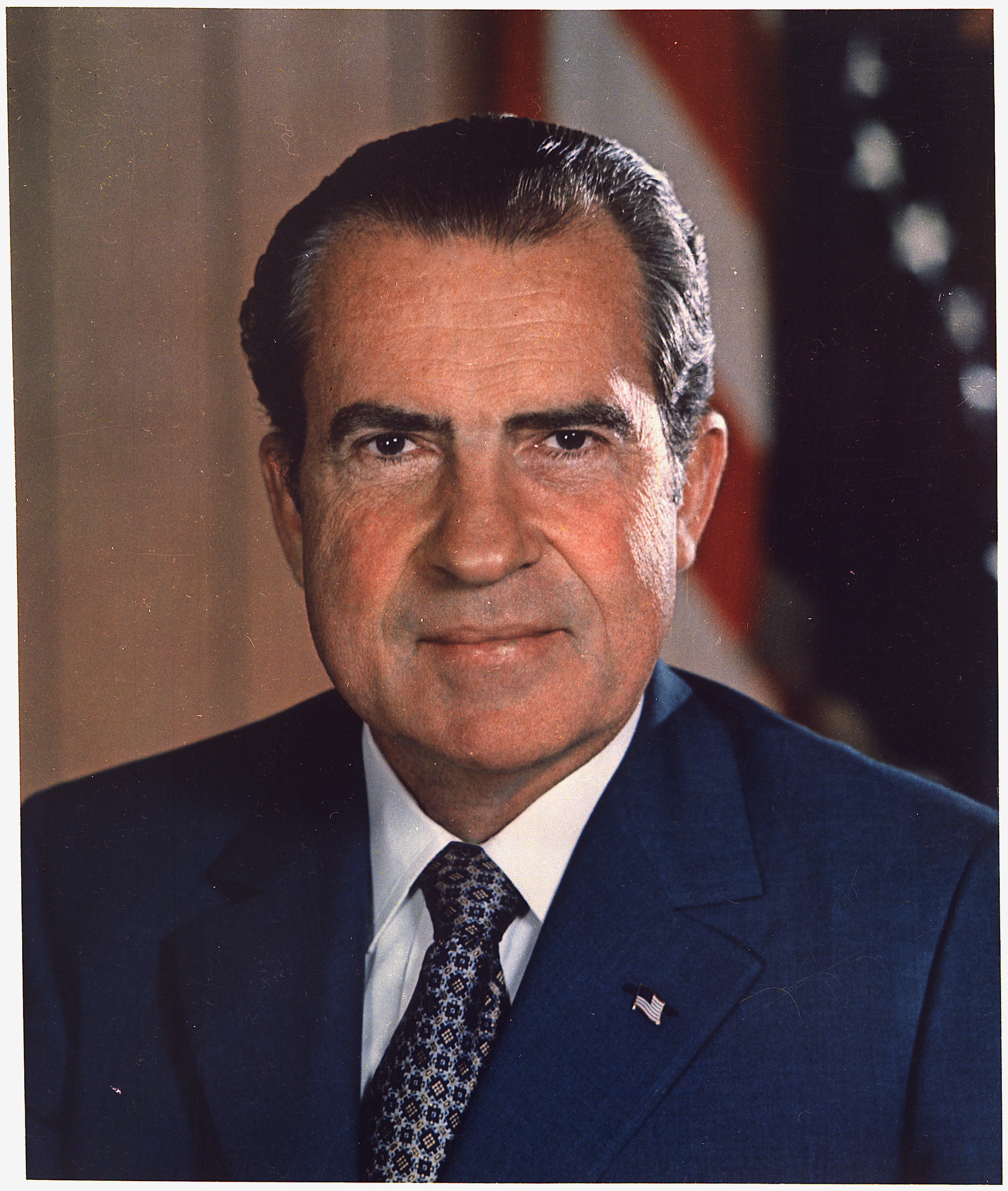Richard Nixon frasi celebri
Frasi sulla patria di Richard Nixon
Origine: Dal discorso tenuto a San Clemente il 3 aprile 1971; citato come epigrafe del romanzo di Philip Roth La nostra gang, traduzione di Norman Gobetti, Einaudi, Torino, 2015, p. 5. ISBN 978-88-06-22731-9
Origine: Citato in Ennio Di Nolfo, Storia delle relazioni internazionali. [Dal 1918 ai giorni nostri], Editori Laterza, Roma, 2008, pp. 1189-1190. ISBN 978-88-420-8734-2
Origine: Leaders, p. 368
Origine: La vera guerra, p. 295
Origine: La vera guerra, p. 113
Frasi sulla guerra di Richard Nixon
Origine: La vera guerra, p. 113
Origine: La vera guerra, p. 107
Origine: La vera guerra, p. 32
Richard Nixon Frasi e Citazioni
“Per anni i politici hanno promesso la luna: io sono il primo in grado di darvela.”
Origine: Citato in Dizionario mondiale di Storia, Rizzoli Larousse, Milano, 2003, p. 826. ISBN 88-525-0077-4
Origine: Da una conversazione desecretata dei primi mesi del 1973; citato in Christopher Hitchens, Quando l'America era in mano a un presidente razzista https://web.archive.org/web/20160101000000/http://archiviostorico.corriere.it/2009/luglio/05/Quando_America_era_mano_presidente_co_8_090705022.shtml, Corriere della Sera, 5 luglio 2009.
“[Ultime parole famose, nel luglio 1974] Non lascerò la Casa Bianca.”
Origine: Citato in Focus n. 88, p. 102.
Origine: Leaders, p. 420
Origine: Leaders, pp. 383-384
Origine: La vera guerra, p. 68
“Il terrorismo minaccia tutti i governi, tranne quelli che lo praticano.”
Origine: La vera guerra, p. 52
Origine: La vera guerra, p. 49
Origine: La vera guerra, p. 35
Origine: La vera guerra, p. 14
Richard Nixon: Frasi in inglese
1960s, What Has Happened to America? (1967)
Conversation with secretary Rose Mary Woods on tapes recorded February-March 1973 http://graphics8.nytimes.com/packages/flash/national/20101211_NIXON_AUDIO/3_VIETNAM.mp3 on tapes recorded February-March 1973; as quoted in "In Tapes, Nixon Rails About Jews and Blacks" http://www.nytimes.com/2010/12/11/us/politics/11nixon.html, by Adam Nagourney, New York Times (10 December 2010); with sound recording http://graphics8.nytimes.com/packages/flash/national/20101211_NIXON_AUDIO/4_BLACKS.mp3.
1970s
“What are our schools for if not for indoctrination against communism?”
Speech http://books.google.com/?id=k3caAQAAIAAJ&dq=%22What+are+our+schools+for+if+not+for+indoctrination+against+communism%22 before a meeting of San Diego educators during the 1962 gubernatorial election.
2000s
No More Vietnams (1987).
1980s
Speech on the October Crisis (October 1970), quoted in Louis, Fournier, F.L.Q: The Anatomy of an Underground movement (Toronto: NC Press Limited, 1984), p. 256
1970s
In conversation with Henry Kissinger regarding Vietnam, as quoted in Secrets: A Memoir of Vietnam and the Pentagon Papers. (2002) by Daniel Ellsberg p. 418 ISBN 0-670-03030-9
2000s
Nixon as Senator, speaking of the Truman administration in 1951, as quoted in Isaac Asimov's Book of Facts (1992), p. 338 http://www.findbookprices.com/detail/0803893477
1950s
To John Dean in April 1973 http://books.google.com/?id=JpRAAAAAIAAJ&dq=%22If+you+are+going+to+lie+you+go+to+jail+for+the+lie+rather+than+the+crime+So+believe+me+don't+ever+lie%22&pg=PA42. Dean was due to testify before the Senate Watergate Committee, which he did on 25 June 1973.
1970s
Nixon, Haldeman, and Ziegler, 4:03 P.M., Oval Office Conversation #537-4; cassette #876 (5 July 1971)
1970s
“I recognize that this additional material I am now furnishing may further damage my case.”
After the court-ordered release of the White House tapes (5 August 1974)
1970s
Telephone message from the Oval office to Neil Armstrong and Buzz Aldrin on the Moon. (20 July 1969)
1960s
1970s, Tape transcripts (1971)
Remarks during a radio address in Moscow, quoted in "1959 Year In Review: Death of John Foster Dulles," http://www.upi.com/Audio/Year_in_Review/Events-of-1959/Death-of-John-Foster-Dulles/12295509433704-3/#title UPI.com (1959)
1950s
“The Jewish cabal is out to get me.”
A remark repeated by Nixon several times in private conversations (c. 1971) as quoted in The Final Days by Bob Woodward
1970s
“A man is not finished when he's defeated. He's finished when he quits.”
1969 note to self, as quoted in Nixon (1987) by Stephen E. Ambrose, p. 284
1960s
Variante: A man is not finished when he is defeated. He is finished when he quits.
“If he gets shot, it's too damn bad.”
Conversation about Senator Edward Kennedy with White House aides H.R. Haldeman and John Ehrlichman (7 September 1972)
1970s, Tape transcripts (1972)
Speech to the assembled White House staff before his final departure (9 August 1974)
1970s
Campaign speech in Michigan (1968) https://books.google.com/?id=uXRx5hGm8zYC&dq="Do+you+want+to+make+a+point+or+do+you+want+to+make+a+change"&pg=PA17
1960s
1970s, Second Inaugural Address (1973)
“Oh, when the President does it, that means that it is not illegal.”
Interview with David Frost (19 May 1977) ( video http://www.youtube.com/watch?v=ejvyDn1TPr8); printed in The New York Times (20 May 1977), p. A16; also in "Nixon's Views on Presidential Power: Excerpts from an Interview with David Frost" http://www.landmarkcases.org/nixon/nixonview.html, referring to the Huston Plan and views of presidential authority.
1970s
Conversation with Charles W. Colson, Feb. 13, 1973 http://graphics8.nytimes.com/packages/flash/national/20101211_NIXON_AUDIO/2_TYPES.mp3, as quoted in "In Tapes, Nixon Rails About Jews and Blacks" http://www.nytimes.com/2010/12/11/us/politics/11nixon.html, by Adam Nagourney, New York Times (10 December 2010)
1970s
As quoted in Convergences (2005) [second edition] by Robert Atwan, [Bedford/St. Martin's. p. 403]
2000s
1970s, Remarks on Being Reelected (1972)
Address to the nation on the situation in Southeast Asia (30 April 1970); in Public Papers of the Presidents of the United States: Richard Nixon, 1970, p. 410
1970s
“Screw State! State's always on the side of the blacks. The hell with them!”
1970s, Tape transcripts (1972)
Origine: Foreign Relations of the United States, 1969-1976 Volume E-5, Part 1, Documents on Sub-Saharan Africa, 1969-1972, Document 258 Conversation Between President Nixon and the President's Assistant for National Security Affairs (Kissinger), Camp David, September 24, 1972, 11:37-11:52 a.m http://history.state.gov/historicaldocuments/frus1969-76ve05p1/d258
1970s, Second Inaugural Address (1973)
1960s, First Inaugural Address (1969)
Address to the nation on the situation in Southeast Asia (April 30, 1970); in Public Papers of the Presidents of the United States: Richard Nixon, 1970, p. 409
1970s
